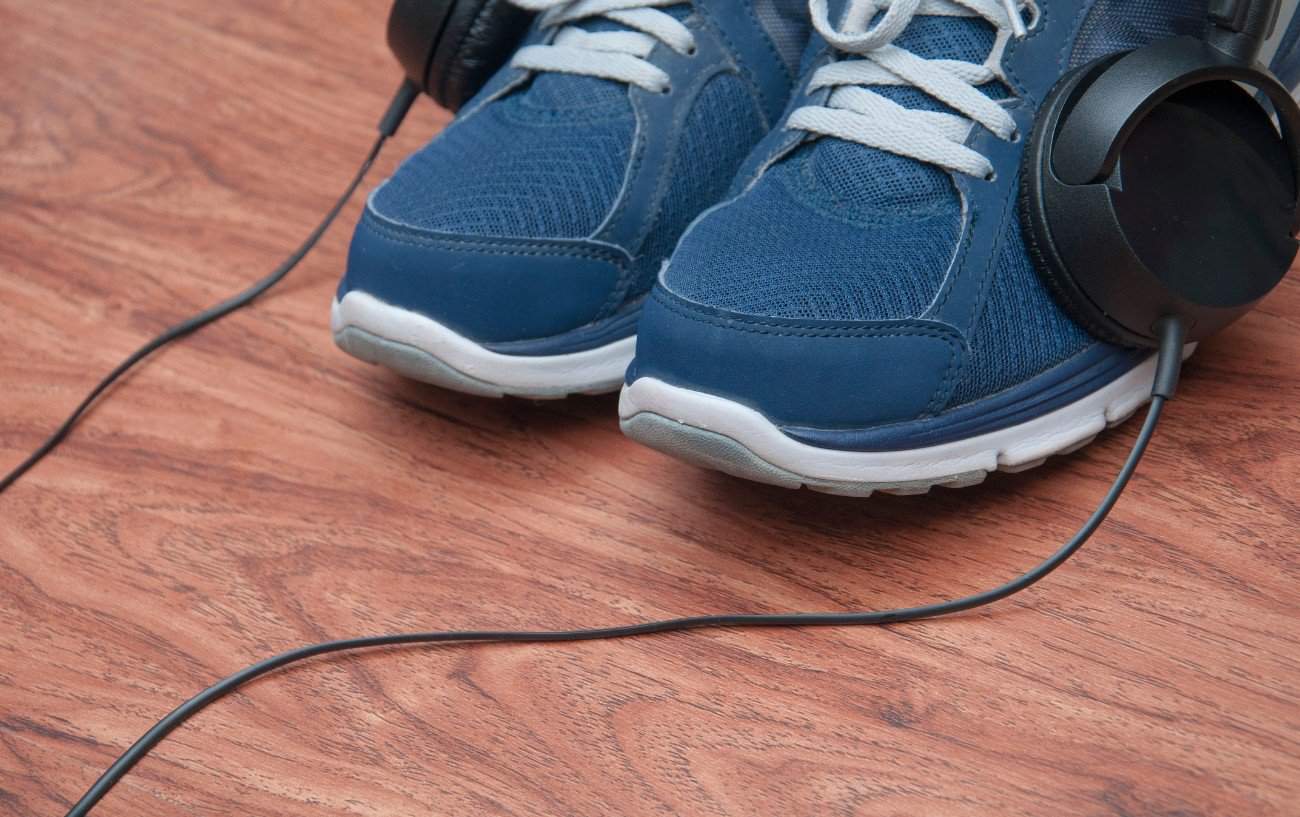We’ve all experienced challenging cardio workouts or tough moments during races where we just need to power through, and boy, is it hard sometimes! I find that a fun, motivational high BPM songs playlist is a great tool to help me push through those challenging training or racing moments.
Music can inspire you, distract you, and even trick your brain into believing you genuinely enjoy your threshold workout. When you are low on energy, either physically or mentally, an upbeat tune can help turn your mood around so you can complete your run or Tabata.
You can use workout music to pump yourself up for a sprinting session, calm your nerves, or improve your running. Whatever your goal, we’ve got running songs for you.
So, let’s turn up the volume, sing along, and discover why music may make running more enjoyable and help you become an even better athlete.

Can High BPM Songs Improve Workout Performance?
Singing and bopping along to your favorite running music can really make your workout experience far more fun and enjoyable.
But why is that? Why is it so motivational to listen to music as we run?
According to neuroscientist Dr. Valorie N Salimpoor,1Salimpoor, V. N., Benovoy, M., Larcher, K., Dagher, A., & Zatorre, R. J. (2011). Anatomically distinct dopamine release during anticipation and experience of peak emotion to music. Nature Neuroscience, 14(2), 257–262. https://doi.org/10.1038/nn.2726 the act of listening to music gives us a “feeling of euphoria.”2Salimpoor, V. (2013, June 21). Dr. Valorie Salimpoor – The Brain and New Music. WAMC. https://www.wamc.org/academic-minute/2013-06-21/dr-valorie-salimpoor-the-brain-and-new-music It intensifies positive emotion through the reward centers of our brain. This stimulates the release of dopamine into our system, making us feel happy and excited.
Not only does it make us feel good, but music can even improve our overall performance as endurance athletes. According to Professor Costas Karageorghis,3Professor Costas Karageorghis. (2014). Brunel University London People; Professor Costas Karageorghis | Brunel University London. https://www.brunel.ac.uk/people/costas-karageorghis who has researched the effect of music on athletes for the past 25 years, “music can reduce your rate of perceived effort by 12% and improve your endurance by 15%44 Remarkable Ways Music Can Enhance Athletic Performance. (2016, March 25). The Health Sciences Academy. https://thehealthsciencesacademy.org/health-tips/music-can-enhance-athletic-performance/ as it blocks out fatigue-related symptoms such as burning lungs, heartbeat and lactic acid build-up in muscles.”
This can make you feel less tired during the workout to be able to obtain a better than expected result.
Related: How To Increase Cadence While Running: 6 Pro Tips
Music also encourages positive thoughts due to the melody, lyrics, and high tempo of the songs. If you have a special memory related to a specific song, this can inspire you and create joyful thoughts as you move along.
Listening to music also blocks out factors that normally distract us, such as labored breathing, our pounding heart, or even negative thoughts. This can be seen as a positive and negative aspect.
Music Safety Precautions
It is important to mention the importance of safety while listening to music while running as it can become a risk in certain environments.
Always be aware of your surroundings, and keep your music or podcast at a reasonable level so as not to completely block out your surroundings. If your music is turned up too loudly while running in precarious conditions like traffic or racing where other runners may be looking to pass, it could cause a risk.
Other than making us feel great, listening to music while training is full of other useful benefits.
Let’s see how we can use specific music to improve running economy and even interval training workouts.
How Can Training With Music Improve My Cadence?
Running cadence, also known as your stride rate or foot turnover, is the total number of steps you take per minute while you run. There is plenty of debate as to the “perfect stride rate” as runners’ compositions can affect this number.
However, there are advantages to shortening and quickening your stride. Most signs point to an efficient average of around 180 SPM (steps per minute). Music works as a metronome, consistently counting out each beat for you, and can assist you in improving yours.
Practice your stride rate by creating a playlist full of songs with your cadence goal steps per minute, which equals beats per minute. If you want to work on a 180 stride rate, set up a list of songs that are all 180-182 BPM. Every time you hear a beat, you want a foot to be hitting the pavement.
If you have a slower cadence, try to increase it gradually, as it is tiring to try and push out an entire run at 180 SPM. If your natural stride rate is 170, you can set up a playlist of songs that are between 172-174 BPM to start. Therefore you are speeding it up just a bit to begin with.
As you improve, update your playlist to include songs a few BPM higher each time. It will really help!

Matching Music to Your Specific Workouts
Depending on the workout, your choice of high BPM songs can make a significant impact on your training results. As each workout progresses and paces change, music choice should also change:
effort increase = music tempo increase
Your pace will naturally follow the beat of the music you are listening to. This being said, each playlist should be strategically put together to give you the best possible results.
In the following list, each of the BPM ranges matches up to a different training effort level. According to Costas, assigning specific tracks to specific workouts with the “tempo rising linearly with exercise heart rate” is essential to reap the benefits of training with music.
Let’s take a look at each range and some examples of songs that fit into each one:
Warm up / Cool down
BPM Range: 100-120 bpm
Song Examples:
- Rock Your Body, Justin Timberlake
- Sweet Home Alabama, Lynyrd Skynyrd
- Just Dance, Lady Gaga
Long Runs, Recovery Runs, Low – Moderate Intensity Workouts
BPM Range: 120-140 bpm
Song Examples:
- I’m Born To Run, American Authors
- Uptown Girl, Billy Joel
- Levels, Avicii

High Intensity Workouts
BPM Range: 140 – 160 bpm
High BPM Songs Examples:
- Can’t Hold Us, Macklemore & Ryan Lewis
- Mr. Brightside, The Killers
- Shake It Off, Taylor Swift
Stride Rate Work, Pre-Race Pump Up
BPM Range: 160 – 180 bpm
Very High BPM Song Examples:
- Renegades, X Ambassadors
- Just Like Fire, Pink
- Count On Me, Bruno Mars
Stretching, Post-Workout
BPM Range: 180 – 200+ bpm
Even higher BPM Song Examples:
- Shape Of You, Ed Sheeran
- My House, Flo Rider
- This Love, Maroon 5

Now, let’s put it all together and see how it will match up along with my workout!
| Workout | Song Title/Artist | Time |
| 10 minute warm up | 1. Bad Romance, Lady Gaga 2. Gimmie! Gimmie! Gimmie!, ABBA | 4:53 4:49 |
| 10 minutes threshold | 3. Toxic, Brittany Spears 4. Harder to Breathe, Maroon 5 5. Hey Yeah!, Outkast | 3:18 2:53 3:55 |
| 5 minute recovery jog | 6. I Gotta Feeling, Black Eyed Peas | 4:49 |
| 10 minute threshold | 7. Shivers, Ed Sheeran 8. Iris, The Goo Goo Dolls 9. Dancin’ Party, Chubby Checker | 3:27 4:50 2:28 |
| 5 minute cool down | 10. Sacrifice, Elton John | 5:04 |
How To Use Music in moderation
As you can see, training with music can be very beneficial, but it can become quite addicting. You must be able to run without music as well and not allow it to become a crutch. There are specific situations where you will be unable to run with music, such as in particular races where it is not allowed.
Switch it up by running some of your weekly workouts with music and some without. This will prepare you for any situation.

Our 160BPM Playlist
We’ve put together the perfect playlist for your next run, with 30 songs that all sit around the 160BPM mark.
Click here to listen to the Marathon Handbook 160BPM Playlist on Spotify!
How Do I Find the BPM of a Song?
There are a couple of different ways to find the beats per minute of a song. You can use the “tap method” or a handy-dandy app!
To use the tap method, turn on the song and tap out the beats for 20 seconds. Take that number and multiply it by 3. There are your BPMs for that song.
There are also applications, such as the BPM Counter, where you can tap on the green button, and your tempo will appear for you at the top. You can reset and restart whenever you need to as you build your playlist.
If you are looking for specific songs, you can go to the BMP database website, type in the track and the artist, and it will give you the BPMs of that song.

To double-check, use two methods. Don’t trust most playlists out there that are already made, as many have mistakes. You’ll need to check and be sure the songs are actually in the stated ranges. You can trust our playlists, of course!
Whether you use hip-hop, Beyonce, boogie, or other music pre-run to energize you, a Rihanna remix for post-run to lower your heart rate and relax, or Foo Fighters during training to help you push through, choose tunes you love that will help you reach your personal goal.
Sit back with a nice cup of coffee and get to planning your playlists.












